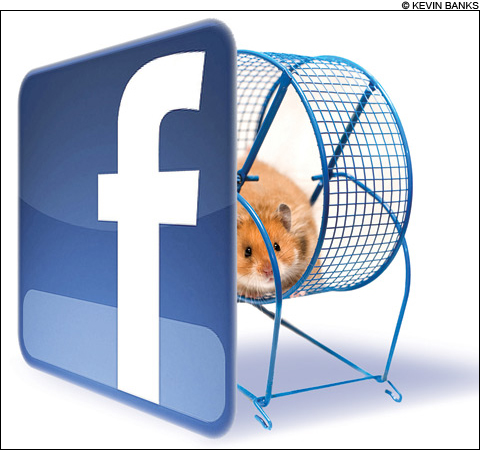
"In many ways, Morgan Stanley and Facebook deserve each other. But how about the rest of us?" |
It is, in the immortal words of Yogi Berra, déjà vu all over again. Not quite four years after the financial meltdown that plunged the world into the worst economic crisis in living memory, the boys and girls on Wall Street are up to their old tricks.
JPMorgan Chase, one of the giant banks that Washington says are too big to fail, but which nevertheless prove to be too powerful to regulate, lost at least $2 billion on a bad trade gone wrong. The so-called investment was really more like a bet — a wager, a throw of the dice. It involved a credit default swap, one of those hard-to-understand 21st-century Wall Street inventions that can make a few people rich while ruining multitudes.
Now, not two weeks later, déjà vu strikes a second time.
This time, it is a group effort. The two culprits: Facebook, the social-media platform that seems bent on nudging Google out of the way in Silicon Valley's race for world domination, and Morgan Stanley, an azure-chip investment bank that — like the other Morgan firm — has Washington's tacit approval to more or less plunder at will.
Morgan Stanley has botched Facebook's initial public stock offering (IPO). That's bad enough.
But it appears that Morgan Stanley did so in such a way that protected a select group of favored investors, while screwing everyone else.
Is this wrong? Unethical? Something your mother would be ashamed of? You bet it is.
But is it illegal? Against the law? That's a bit unclear. Here in Massachusetts, Secretary of State Bill Galvin is investigating. Galvin has a good record for sniffing out shady securities deals. The public awaits his findings. Go get 'em, Galvin.
The question is: will anyone in Washington follow his lead?
The Securities and Exchange Commission has expressed "concern" with these "issues," whatever that means.
Facebook's IPO price was $38. The idea was that, once the shares begin to trade, they should increase in value. But that's not what happened. Facebook's shares declined, first to around $33 and then to $31.
In fairness, IPOs can be tricky and don't always go according to plan. But for an offering as high-profile as Facebook, brought to market by an investment bank as supposedly reliable as Morgan Stanley (along with JPMorgan Chase and Goldman Sachs), this is nothing short of an embarrassment.
Only on Wall Street can someone botch a two-car cavalcade and collect a honking multi-million dollar fee for doing so.
Here are some of the problems with the deal:
First of all, it was wildly inflated. Facebook and its bankers wanted to set a record for an IPO.
At $38 a share, the company's market valuation was established at just over $100 billion.
But the numbers just don't justify that. Compare how much revenue Facebook makes per user with the same amount Google throws off and you'll see why.
Last year, each Facebook user generated $5.11.
Google, during the same year, generated $30 per user.
There is no doubt that at this moment in time Facebook is the digital comer, the company with a lot of promise. But that doesn't mean it hasn't been overhyped and oversold.